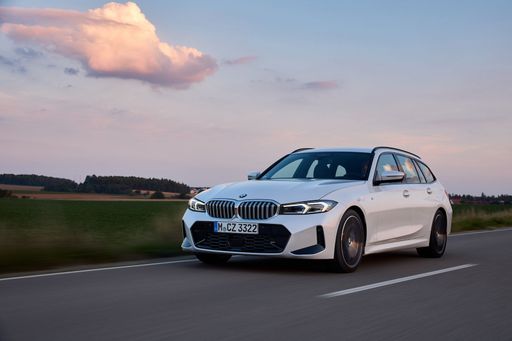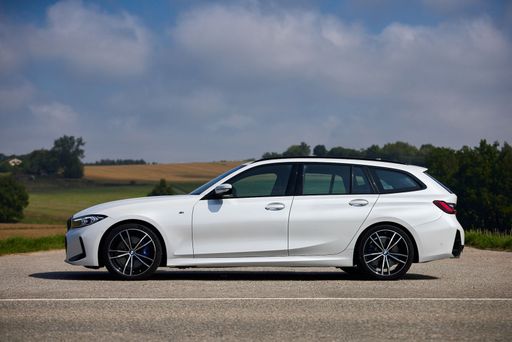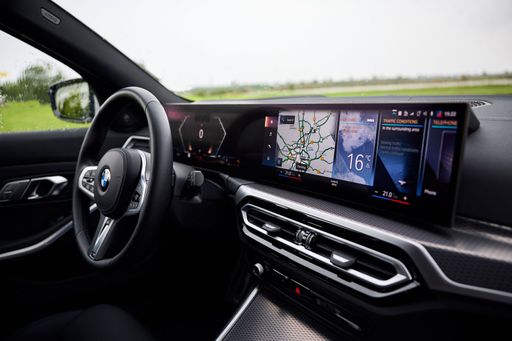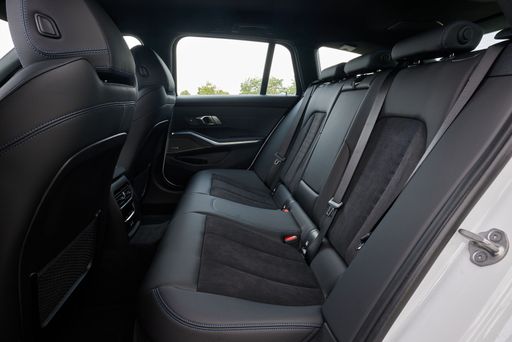BMW 3 Series Touring vs Hyundai Tucson - Diferencias y precios comparados
Compara potencia (550 HP vs 288 HP), maletero y precio (51000 € vs 24800 €) de un vistazo. Descubre ahora cuál es la mejor elección para ti – BMW 3 Series Touring o Hyundai Tucson.
Costes y consumo
El precio y la eficiencia suelen ser los primeros criterios. Aquí se ve qué modelo mantiene la ventaja a largo plazo, ya sea repostando, cargando o al comprar.
Hyundai Tucson tiene una ventaja claro en precio: parte desde 24800 €, mientras que el BMW 3 Series Touring cuesta 51000 €. La diferencia es de unos 26229 €.
También se aprecia una diferencia en el consumo: el BMW 3 Series Touring gasta 2.50 L y es ligero más eficiente que el Hyundai Tucson, que consume 2.70 L. La diferencia es de unos 0.20 L cada 100 km.
En autonomía, el BMW 3 Series Touring ofrece un rendimiento notable mejor: alcanza hasta 97 km, unos 27 km más que el Hyundai Tucson.
Motor y rendimiento
Debajo del capó se descubre qué modelo tiene un carácter más deportivo y quién acelera mejor.
En cuanto a potencia, el BMW 3 Series Touring tiene una ventaja convincente: 550 HP frente a 288 HP. Eso supone un aumento de unos 262 HP CV.
En aceleración de 0 a 100 km/h, el BMW 3 Series Touring es decisivo más rápido: completa el sprint en 3.50 s, frente a 7.50 s del Hyundai Tucson. Es aproximadamente 4 s más veloz.
En velocidad máxima, el BMW 3 Series Touring es un poco superior – alcanza 250 km/h, mientras que el Hyundai Tucson se queda en 204 km/h. La diferencia es de unos 46 km/h.
También hay diferencias en el par motor: el BMW 3 Series Touring empuja significativo con 700 Nm frente a 379 Nm. La diferencia ronda los 321 Nm.
Espacio y practicidad
Habitabilidad, maletero y carga útil determinan la funcionalidad en el día a día. Aquí cuentan la comodidad y la flexibilidad.
Ambos modelos ofrecen espacio suficiente para 5 personas.
En peso en vacío, el Hyundai Tucson es apenas perceptible más ligero – 1542 kg frente a 1650 kg. La diferencia ronda los 108 kg.
En capacidad de maletero, el Hyundai Tucson ofrece algo más espacio – 620 L frente a 500 L. La diferencia es de unos 120 L.
En capacidad máxima de carga, el Hyundai Tucson es un poco mejor – hasta 1799 L, unos 289 L más que el BMW 3 Series Touring.
En capacidad de carga útil, el Hyundai Tucson apenas perceptible se impone – 545 kg frente a 520 kg. La diferencia es de unos 25 kg.
¿Quién es el ganador del duelo?
En general, el BMW 3 Series Touring se muestra domina la comparación y se lleva el título de DriveDuel Champion.
Destaca por su equilibrio general y por ser el compañero más versátil en el día a día.

BMW 3 Series Touring
Costos y consumo
Ver análisis detallado
Motor y rendimiento
Ver análisis detallado
Dimensiones y carrocería
Ver análisis detallado
BMW 3 Series Touring
El BMW Serie 3 Touring mezcla la elegancia y el carácter deportivo de la berlina con la practicidad necesaria para el día a día, presentando un aspecto sobrio pero decidido y un maletero pensado para no complicarte la vida. En carretera se siente ágil y comunicativo, y para el comprador que busca una alternativa premium con espacio y diversión al volante, es difícil encontrar una opción con tanto equilibrio —además, siempre hará que los viajes, y el ego, sean un poco más agradables.
detalles




Hyundai Tucson
El Hyundai Tucson combina un diseño moderno y audaz con una conducción cómoda que se adapta bien tanto a la ciudad como a viajes más largos. Es una opción sensata para quien busca espacio práctico, tecnología fácil de usar y una presencia en la carretera que no pasa desapercibida, todo sin complicaciones innecesarias.
detalles





|

|
|
|
|
Costos y consumo |
|
|---|---|
|
Precio
51000 - 178400 €
|
Precio
24800 - 56800 €
|
|
Consumo L/100km
2.5 - 10.5 L
|
Consumo L/100km
2.7 - 7.6 L
|
|
Consumo kWh/100km
-
|
Consumo kWh/100km
-
|
|
Autonomía eléctrica
91 - 97 km
|
Autonomía eléctrica
63 - 70 km
|
|
Capacidad de la batería
19.50 kWh
|
Capacidad de la batería
-
|
|
co2
57 - 238 g/km
|
co2
62 - 172 g/km
|
|
Capacidad del tanque
40 - 59 L
|
Capacidad del tanque
52 - 54 L
|
Dimensiones y carrocería |
|
|---|---|
|
Tipo de carrocería
Familiar
|
Tipo de carrocería
SUV
|
|
Asientos
5
|
Asientos
5
|
|
Puertas
5
|
Puertas
5
|
|
Peso en vacío
1650 - 2025 kg
|
Peso en vacío
1542 - 1893 kg
|
|
Capacidad del maletero
410 - 500 L
|
Capacidad del maletero
546 - 620 L
|
|
Longitud
4713 - 4714 mm
|
Longitud
4525 - 4535 mm
|
|
Anchura
1827 - 1918 mm
|
Anchura
1865 mm
|
|
Altura
1440 - 1448 mm
|
Altura
1650 mm
|
|
Capacidad máxima del maletero
1420 - 1510 L
|
Capacidad máxima del maletero
1795 - 1799 L
|
|
Capacidad de carga
405 - 520 kg
|
Capacidad de carga
518 - 545 kg
|
Motor y rendimiento |
|
|---|---|
|
Tipo de motor
Híbrido ligero diésel, Gasolina, Híbrido ligero gasolina, Híbrido enchufable
|
Tipo de motor
Gasolina, Híbrido completo, Híbrido enchufable, Híbrido ligero diésel
|
|
Transmisión
Automática
|
Transmisión
Manuel, Automática
|
|
Detalle de transmisión
Caja automática
|
Detalle de transmisión
Caja manual, Automático de doble embrague, Caja automática
|
|
Tipo de tracción
Tracción trasera, Tracción total
|
Tipo de tracción
Tracción delantera, Tracción total
|
|
Potencia HP
150 - 550 HP
|
Potencia HP
136 - 288 HP
|
|
Aceleración 0-100km/h
3.5 - 8.8 s
|
Aceleración 0-100km/h
7.5 - 11.6 s
|
|
Velocidad máxima
213 - 250 km/h
|
Velocidad máxima
196 - 204 km/h
|
|
Par motor
250 - 700 Nm
|
Par motor
250 - 379 Nm
|
|
Número de cilindros
4 - 6
|
Número de cilindros
4
|
|
Potencia kW
110 - 405 kW
|
Potencia kW
100 - 212 kW
|
|
Cilindrada
1995 - 2998 cm3
|
Cilindrada
1598 cm3
|
General |
|
|---|---|
|
Año del modelo
2024 - 2025
|
Año del modelo
2025
|
|
Clase de eficiencia de CO2
D, E, F, G, B
|
Clase de eficiencia de CO2
F, D, E, B
|
|
Marca
BMW
|
Marca
Hyundai
|
¿El BMW 3 Series Touring se ofrece con distintas tracciones?
El BMW 3 Series Touring se ofrece con Tracción trasera o Tracción total.
Los precios y datos mostrados son estimaciones basadas en los precios de lista en Alemania y pueden variar según el país. Esta información no es legalmente vinculante.
